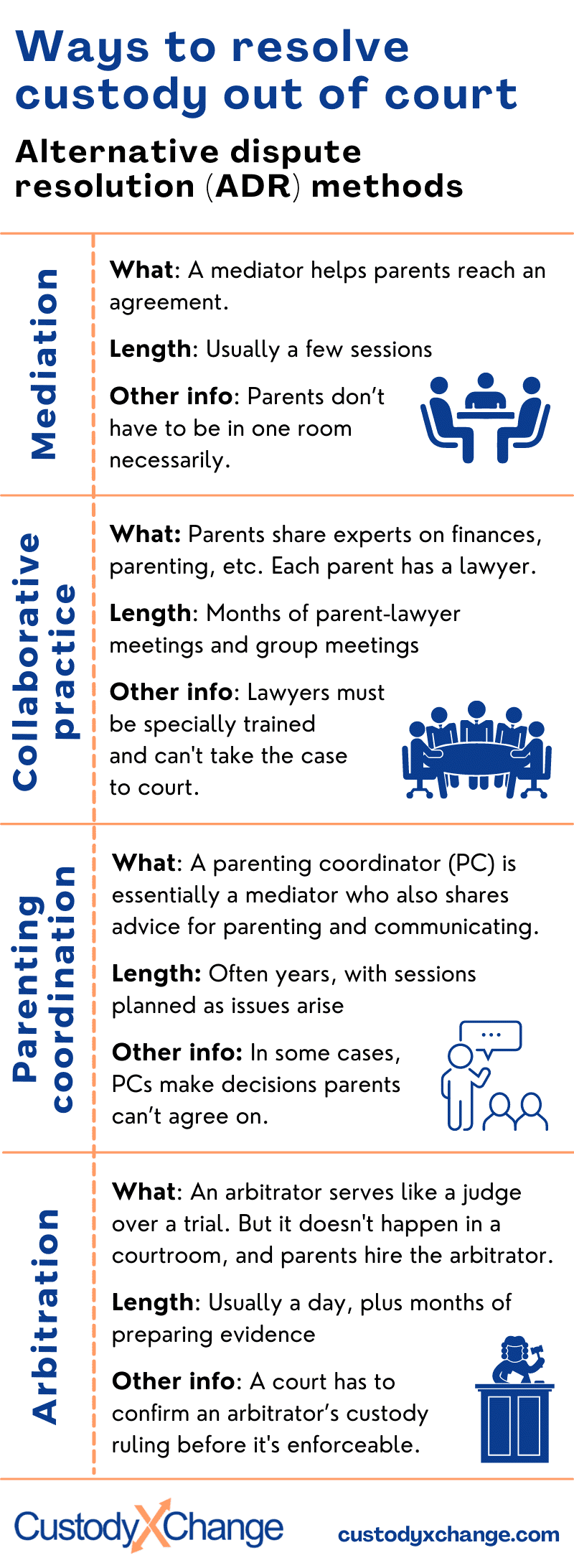Alternative Ways to Decide Custody in Michigan
In Michigan, most custody cases are decided outside of court, through one of the alternative dispute resolution options below.
Most help parents agree on a settlement. In arbitration, however, decisions are made for parents instead of by them.
If you're looking to avoid a lengthy and expensive court process that strains you and your children, consider these options.

Conciliation
Friend of the Court (FOC) case managers hold informal conciliation meetings to help parents discuss possible parenting schedules for both temporary and final orders.
Most FOC offices require a conciliation meeting early in the custody process, usually as the step after filing a case.
If a case involves domestic violence, the manager meets with each parent separately.
If parents don't resolve their issues in the meeting, the FOC may make a custody recommendation to the court or suggest other dispute resolution options.
Mediation
In mediation, an unbiased family law expert helps parents resolve disputes to arrive at a parenting schedule and, optionally, a parenting plan.
Parents may choose to go to mediation at any time. Many courts require parents to attempt mediation before requesting a final custody hearing (except in cases involving domestic violence).
Parents can use a mediator from a community dispute resolution center, a private practice or — once they have a case open — their Friend of the Court office.
Collaborative law
In collaborative law, each parent commits to settling with the help of their attorney and a team of experts.
More than traditional negotiations with lawyers, the collaborative process focuses on creating an effective and lasting co-parenting relationship. Parents usually receive education on communicating and parenting through a separation. Everyone involved signs an agreement committing to cooperation, confidentiality and honesty.
Each parent must have a lawyer. Collaborative teams also typically include a financial expert and divorce coaches or mediators. They may also have child development specialists, parenting coordinators, mental health professionals or religious advisers.
Parents — sometimes together, sometimes separately — meet with the team until they reach a complete settlement, which generally takes a few months.
If the parents don't reach a settlement and have to litigate in court, all the professionals must withdraw from case, including the lawyers.
Arbitration
Parents can empower an arbitrator to make decisions in their case. Arbitrators are neutral lawyers who issue rulings that the court then formalizes. Parents must abide by the rulings and generally can't appeal.
Arbitration is similar to a final custody hearing with a judge, but less formal. It gives parents more say in the process, as well. Together, parents select the arbitrator and the issues to be decided (e.g., custody but not property division). They also choose the hearing date and procedures (e.g., what evidence is allowed).
In addition, arbitration offers privacy. It takes place in a conference room closed to the public; a court hearing, on the other hand, happens in a public courtroom (except in rare cases where a judge blocks access). In arbitration, everyone agrees to confidentiality, and proceedings are recorded only if parents agree to it.
Some arbitrators require each parent to have an attorney, while others allow parents to represent themselves.
Informal negotiation
Parents who can communicate and compromise without professional help may be able to negotiate an agreement on their own.
Before you sign, however, have a legal professional review your agreement.
If you only manage to reach consensus on certain things, you can hire a lawyer to help you negotiate the unresolved issues (called limited scope representation), or you can try one of the alternative dispute resolution options above.
Preparing for alternative dispute resolution sessions
Preparation is as important when you decide custody through an alternative method as when you decide it in a courtroom.
You'll still be trying to convince someone — the other parent or an arbitrator.
A proposed parenting plan with a parenting schedule presents your argument persuasively. You may also want to present messages exchanged with the other parent, a log of important interactions with the other parent, your child's expenses, and more.
The Custody X Change online app lets you create all of this in one place.

You can customize this to fit your situation with Custody X Change.
It has:
- A parenting plan template
- Customizable parenting calendars
- Printable parent-to-parent messaging
- A parenting journal
- An expense tracker
- And beyond
Custody X Change makes sure you're prepared to get what's best for your child through any method of deciding custody.
